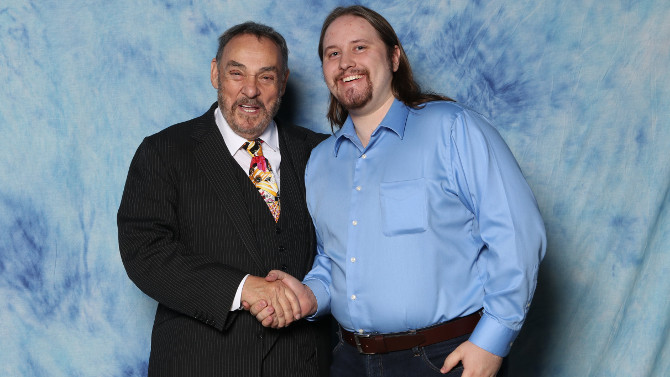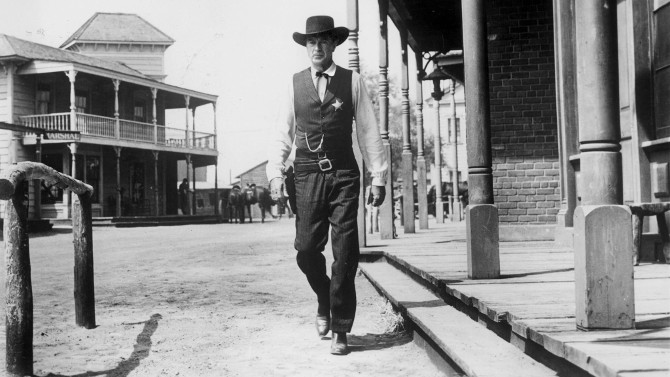There may be no film that better encapsulates the idea of doing what is right or just rather than what is popular or easy than the classic 1952 western High Noon. I recently chatted with iconic character actor John Rhys-Davies, who has created wonderful personas in memorable films such as The Lord of the Rings trilogy (Gimli), Raiders of the Lost Ark/Indiana Jones and The Last Crusade (playing Indiana Jones’ loyal pal Sallah), or portraying General Pushkin in the 1987 James Bond flick The Living Daylights, to name but a few. He may have given me the most eloquent and powerful answer I have yet heard in response to my question of ‘what is your favourite film?’. He took me back to his childhood – his parents moved to the African country of Tanzania, where his father took the job of being a Colonial Police Officer for several years when he was just a young boy. He spoke of how his father was the only one upholding the law; a man who was strong-willed and did what was right – no matter how difficult the task. Surrounded by corruption and apathy, the man continued to do the best job he could; Rhys-Davies also stated that his father once single-handedly put down a riot by himself. It is these virtuous actions that drew him to Gary Cooper’s character Will Kane in High Noon. The role is emblematic of his father, and he divulged that, over time, the fictional character and his father have merged in his mind as being one and the same – as they both stood for what is right; and he loves them both. He concluded with saying that he also hopes that he can do what is right in life, not necessarily what is popular or easy – as he has been influenced by these two personas (one real and one fictional), that have shaped him so that he could follow a proper and honourable path.
High Noon is set in real time – one of the first movies to do so; the others are Hitchcock’s Rope and the boxing film noir The Set-Up. We watch our hero Marshal Will Kane (Gary Cooper) get married to his Quaker bride Amy Fowler (Grace Kelly), and then discover that in just over an hour, a man who was meant to be on death row (but was let off on a legal technicality), namely Frank Miller (Ian MacDonald), will be arriving on the noon train to exact revenge on the townspeople who put him away. His three outlaw friends Ben (Sheb Wooley), Jack Colby (Lee Van Cleef) and Jim Pierce (Robert J. Wilke) are eagerly awaiting him at the train station.
Kane is no longer the Marshal, having just handed in his badge (his replacement will be arriving tomorrow), so his friends promptly push the man, who arrested Miller, out of town along with his new bride. It does not take long for the righteous man to turn around – realizing that it is still his job to defend the townspeople and keep the city streets safe (plus, he knows Miller will be hot on his tracks after he punishes those in the village). As he has already quashed Miller’s bandits once before, he hopes to deputize a posse to combat the criminals.
We watch in dismay as Kane makes his rounds, only to hear one friend after another tell him no to his face. He logically tries to sway deputy Harvey Pell (Lloyd Bridges) to his side, yet the man is embittered by the fact that he did not get the Marshal’s job. He attempts to barter his loyalty in exchange for the position, but Kane will have none of it.
Those who have previously crossed the criminal, such as his former lover Helen Ramírez (Katy Jurado) or Judge Mettrick (Otto Kruger), who put the man behind bars, are fleeing the city in fear of retribution. Kane’s wife also disagrees with the man’s seemingly foolish decision. Having witnessed the death of both her father and brother at the hands of those who carried guns, she became a Quaker to demonstrate her hate of violence. She decides to leave town on the noon train rather than see another loved one die in plain sight – giving her husband the ultimatum of joining her or losing her.
Kane continues on with his task, trying the Sunday hot spots including the bar and the church. The patrons of the saloon show no interest in helping, some even admit to being friends with Miller. Pell can be seen drinking away his sorrows at a table. The only man who is brave enough to help is the one-eyed town drunk, though Kane shakes him off, telling him that he will call him if needed.
There is more of a willingness to help from the churchgoing congregation . . . yet after a lengthy debate, they go against the Marshal as they fear he will only spark more violence (which will negatively affect outsider opinion of the city – as several businesses are looking to move to the locale).
As the clock continues to tick towards noon (the camera pans to different timepieces to remind us of the impending doom), the Marshal turns to several of his best friends for help, including former lawman Martin Howe (Lon Chaney Jr.), who refuses to provide his assistance as he is too old and frail. It is no better at Sam Fuller’s (Harry Morgan) house, as he sends his wife Mildred (Eve McVeagh) to the door against her will to say that he is not at home. Even a man who tracked him down earlier in the day to offer his help reverses his decision when he realizes that not one other person is willing to join the posse.
In a moment of weakness, Kane heads to the stables, contemplating a secret departure. Pell sees this from the bar window and follows. Trying to appease his own psyche, he prompts Kane to leave – though the Marshal decides against it. Pell jumps him, trying to knock him out and send him on his way, yet the tenacious man subdues the former deputy just prior to the clock striking noon. In a quietly intense, heartbreaking shot, director Fred Zinnemann pans the camera up above the town as we watch Kane head out to meet the villainous gang, alone, in the wide, dust-covered empty street.
High Noon perfectly captures one man’s lonely journey to do what is right, despite it being an overwhelmingly unpopular decision. It is a powerful experience, as each performance, be it big or small, illustrates the stress of the situation. Of course, Cooper drives the proverbial horse and carriage (and he does a miraculous job – he won the Academy Award for Best Actor for his performance), yet it is equally as impressive as we watch other characters struggle with the same difficult decision Kane had to make – making for one heck of a moral quandary. Yet each in turn says no, and we can see how hard those words are to say (at least for most). There are intriguing opposing forces as well, such as the bartender (Larry J. Blake) who is betting on how long it will be before Kane is dead, or the cruel and gossipy hotel clerk (Howland Chamberlain) – who cannot wait to see the Marshal dead as his business has suffered since he arrested Miller. Similarly, we watch Kane head into the barber shop only to hear that the hairdresser’s partner is making a casket in the back room. It is not a malicious act like the ones above, though it does not help the protagonist – the noise of the hammer only makes the coming chaos feel even more ominous.
The music must also be highlighted. Dimitri Tiomkin’s powerful score is extremely memorable and it fittingly earned the man an Academy Award for his work. The theme song, titled ‘Do Not Forsake Me, O My Darlin’’ also won at the Oscars, giving Tiomkin a second statue along with one for his writing partner Ned Washington. The song, which is sung by Tex Ritter, perfectly illustrates the tale, capturing the honour and obligation of our lead as well as the moral dilemma that faces his nervously frustrated new wife.
High Noon is an excellent film produced by Stanley Kramer. It depicts one man’s unpopular yet righteous decision to do what needs to be done in order to fulfil his duty as lawman; essentially his destiny. It contains a solid story, memorable roles, wonderful music and tells a tale whose themes are just as important today as they were all those years ago. So don’t forsake this wonderful western classic, for it is a complicated journey well worth taking.


